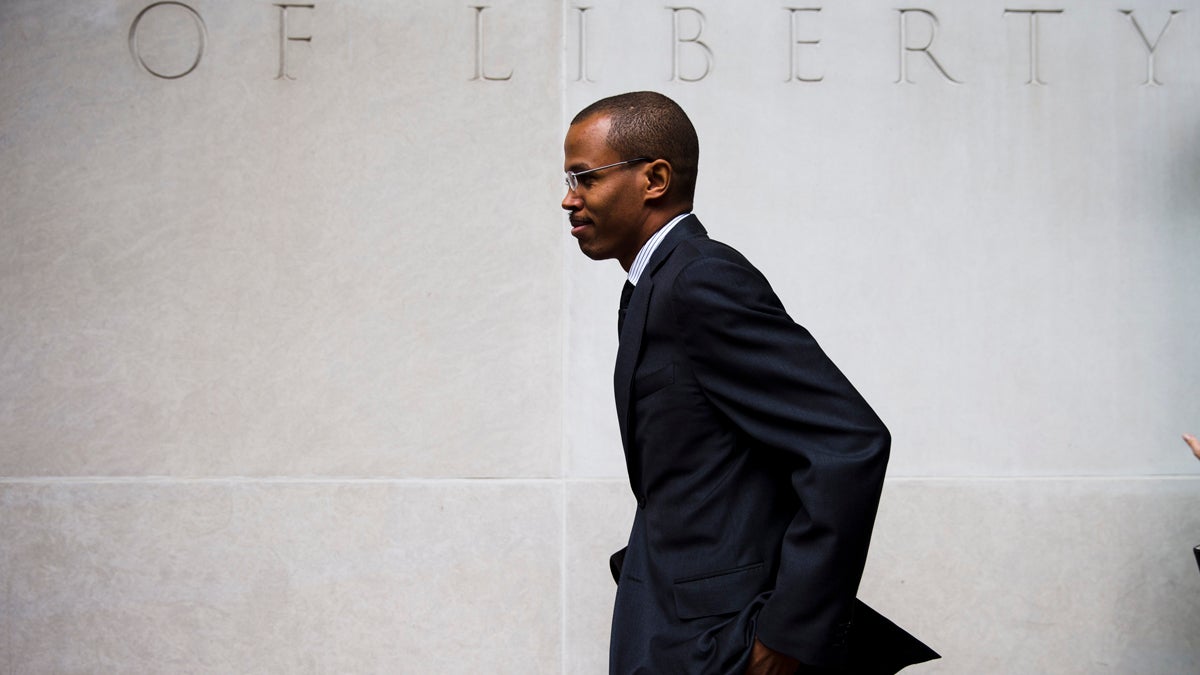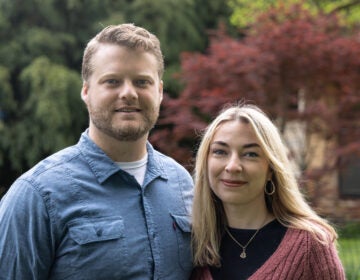Federal fraud case against Fattah Jr. goes to jurors
Listen
A federal court jury heard daylong closing arguments, and deliberated for about a half hour, over the case of Chaka Fattah Jr. The son of U.S. Rep. Chaka Fattah has pleaded not guilty to bank and tax fraud. (AP file photo)
Jury deliberations in the federal fraud trial of Chaka “Chip” Fattah Jr. began Tuesday after impassioned closing arguments in which prosecutors depicted Fattah as a felonious fabulist who cloaked his life as a respectable businessman.
Before the jury began weighing the charges, the government took pains to disgrace Fattah, a college dropout, by characterizing his closing statements as “a senseless diatribe” and “an insult to your intelligence,” in final words that occasionally broke into full-on screaming.
At issue are 23 federal counts leveled at Fattah over allegedly making false statements under oath, lying to several banks to receive loans, stealing from the Philadelphia School District and filing false tax returns.
U.S. Attorney Eric Gibson told the jury that, on multiple occasions, Fattah tricked banks into believing that he needed loans for “working capital,” but in fact he used the money for other things.
“Boxes of unused business cards. Armani suits. Fake brochures. And a dizzying array of credit card and bank accounts do not make one a legitimate businessman, or the next Mark Zuckerberg any more than sitting on the couch eating Fiesta pizza and watching ‘Law and Order’ make one an attorney,” Gibson said. “So enough with the lying, the cheating, the stealing. Time for accountability.”
Fattah, who’s representing himself, told jurors that the government has overplayed his spending to fit their portrayal.
“The government is just upset,” Fattah said. “That they don’t like my lifestyle, they just don’t like it. ‘Hey, he was at a restaurant, you know, he ate at places I can’t afford to go to.’ That’s the government’s problem with this,” he said.
Among the witnesses prosecutors called upon over the course of the weeks-long trial was Matthew Amato, Fattah’s former business partner and roommate, who took a plea deal in exchange for testifying against Fattah.
Federal officials secretly recorded conversations between Amato and Fattah that were later played for jurors in court, and some of the remarks were played again during the federal government’s closing arguments.
Fattah is the son of U.S Rep. Chaka Fattah, who is set to stand trial in May on separate federal corruption charges.
Tapping into the contacts in his dad’s substantial political Rolodex, Fattah brought in former Pennsylvania Gov. Ed Rendell, former Philadelphia Mayor John Street and a lawyer from U.S. Rep. Bob Brady’s office. They all said they were satisfied customers of Fattah’s, though none of them knew anything about the “shell” business at the core of the federal indictment: 259 Strategies.
Prosecutors said Fattah, 32, applied for thousands of dollars in loans before 259 even existed.
U.S. Attorney Paul Gray reminded jurors of how Fattah rang up a $15,000 tab at Capital Grille that he never paid.
“What kind of person sticks a restaurant for $15,000 and runs away laughing about it? This kind of person. A cheat. And a deadbeat,” Gray said.
Throughout the trial, Fattah has maintained that he never intentionally lied on official documents and that legitimate earnings funded his extravagant lifestyle.
Fattah said the businesses he operated were diverse, from photography to personal concierge services to educational consulting. But prosecutors argue that some of those enterprises were a sham, and that he inflated expenses to line his wallet and avoid federal taxes.
“This case by the government starts from the fundamental misunderstanding of what it mean to be a businessman,” Fattah told the jurors.
The government, though, said he operated a nearly nonexistent business and fabricated clients.
“Everyone accused of a crime from the truly indigent to the son of the privileged is entitled to his day in court,” Gibson said. “In this case, the government has demonstrated guilt not beyond a reasonable doubt. Beyond all doubt.”
Juror deliberations resume Wednesday.
WHYY is your source for fact-based, in-depth journalism and information. As a nonprofit organization, we rely on financial support from readers like you. Please give today.




